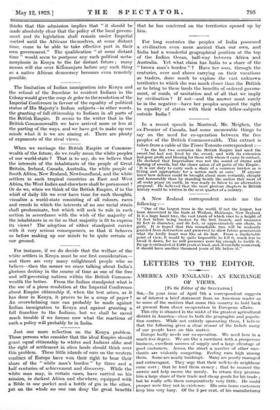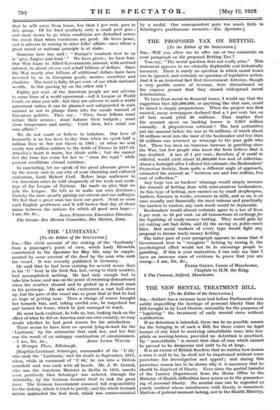LETTERS TO THE EDITOR.
AMERICA AND ENGLAND : AN EXCHANGE OF VIEWS.
[To the Editor of the SPECTATOR.] SIR,ŌĆöIn your .issue of April 7th a correspondent suggests as of interest a brief statement from an American reader as to some of the motives that cause this country to hold back at present from closer co-operation in European affairs.
This city is situated in the midst of the greatest agricultural district in AmericaŌĆöclose to both the geographic and popula- tion centres. While not entirely sponsoring them, I believe that the following gives a clear r├®sum├® of the beliefs many of our people have on this matter.
Europe badly needs our co-operation. We need hers in a much less degree. We are like a merchant with a prosperous business, excellent sources of supply and a large clientage of good customers. Across the street a number of other mer- chants are violently competing. Feeling runs high among them. Some are nearly bankrupt. Many are poorly managed and extravagant. They urge that their well-to-do neighbour come over ; that he lend them money ; that he counsel the unwise and help coerce the unruly. In return they promise him a large share of their trade and cheap goods for his trade ; but he really sells them comparatively very little. He could prosper were they not in existence. His own home customers keep him very busy. Of the 5 per cent. of his manufactures
that he sells away fro= home, less than 1 per cent. goes to this group. Of his food products only a small part goes ;. and more seems to go when conditions arc disturbed across the street than when conditions are good. He loves peace, end is adverse to mixing in other folks' affairsŌĆösave where a great moral or national principle is at stake.
Someone here has said : " Europe's constant text to us is ' give, forgive and lend.' " We have given ; we have lent. Our War loans to Allied Governments amount, with accrued interest, to about eleven and a-half billions of dollars. Since- the War nearly nine billions of additional dollars have been invested by us in European goods, monies, securities and charities. The total is fully 10 per cent. of our whole national wealth. Is this passing by on the other side ?
Eighty per cent. of the American people are not adverse to some form of a world agreementŌĆöcall it League or World Court, or what you willŌĆöbut they are adverse to such a world agreement unless it can be planned and safeguarded in such manner as not to plunge them into the unsafe turmoil of European politics. They say : " First, those fellows must reduce their armies ; must balance their budgets ; must show temperance and sanity. Until then, let's mind our own affairs."
We do not court or believe in isolation. Our love of humanity is no less keen to-day than when we spent half a million lives to free our slaves in 1861 ; or when we sent nearly two million soldiers to the fields of France in 1917-18. America's heart is warm, her ideals noble ; but she cannot feel the time has come for her to " cross the road " while present conditions abroad continue.
In concluding, let me speak of the great pleasure given us by the recent visit to our city of your charming and cultured statesman, Lord Robert Cecil. Before large audiences in ten American cities he told eloquently of the work and work- ings of the League of Nations. He made no plea that we join the League. He left us to make our own decisions ; thereby the more greatly gaining our esteem and our suffrages. We feel that a great man has been our guest. Send us more such English gentlemen and it will hasten that day of closer union between the nations for which all good men hope.ŌĆö



















































 Previous page
Previous page